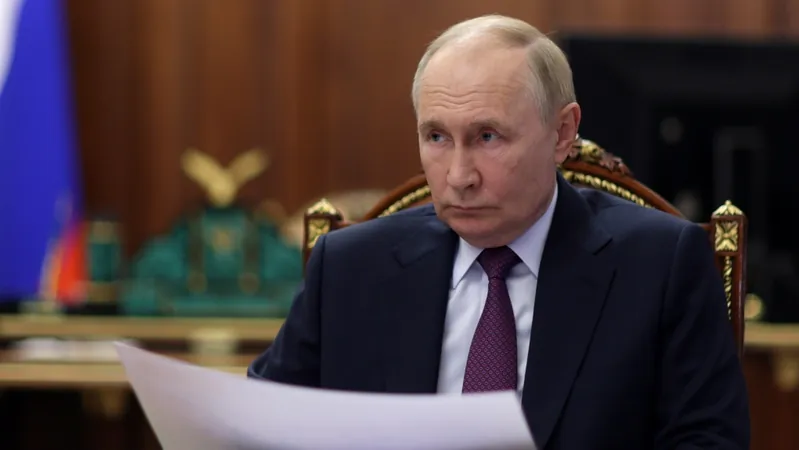
Are We Witnessing the End of Russian Gas Supremacy in Europe?
2024-12-31
Author: Noah
Moscow, Russia - A Significant Shift in Geopolitical Landscape
In a significant shift in the geopolitical landscape, Russian energy giant Gazprom announced a reduction in gas supplies to Europe via Ukraine on Tuesday, coinciding with the last day of a critical transit deal that has sustained gas flows amidst the ongoing conflict in Ukraine over the past three years.
The Expiring Transit Agreement
As the sun sets on a five-year transit agreement between Russia and Ukraine, which expires Jan. 1, 2024, the implications are staggering. Analysts are predicting that, without a last-minute agreement, this move could mark a pivotal decline in Moscow's once formidable grip on the European gas market.
Vulnerable Position of EU Nations
Russian President Vladimir Putin has lamented the lack of time to negotiate a new contract, leaving EU nations in a vulnerable position. The impact of this loss extends far beyond energy supplies; it echoes through the market, where countries like Slovakia and Austria have scrambled to secure alternative energy sources.
Market Reactions
Surprisingly, analysts expect minimal disruption, as the gas supply from Russia has dwindled significantly, leading to a slight increase in prices at the Title Transfer Facility in the Netherlands, where natural gas is traded.
A Geopolitical Turning Point
This moment marks a major geopolitical turning point. Following Russia's invasion of Ukraine, European countries have drastically reduced their reliance on Russian gas, leading to a significant loss of market share for Moscow to competitors like the United States, Qatar, and Norway.
Gazprom's Financial Losses
Gazprom, once the world’s leading gas exporter, reported losses that reached a staggering $7 billion in 2023—the company’s first annual loss since 1999.
Economic Ramifications
The supply halt is not just about numbers; it symbolizes the broader crisis facing Europe. The reduced availability of inexpensive Russian gas has contributed to an economic downturn characterized by rising inflation and plunging living standards.
Impact on Germany and Industrial Competitiveness
Countries like Germany, critical to Europe’s industrial backbone, face serious concerns about their global competitiveness, a situation exacerbated by the move away from Russian energy.
The Long and Complex History of Russian Gas Supply
The history of Russian gas supply to Europe is long and complex, with the country holding a commanding 35% of the market at its peak. However, this dominance is crumbling.
Inoperable Pipelines
Major pipelines, including Yamal-Europe through Belarus and Nord Stream under the Baltic Sea, have been rendered inoperative, impacting gas flows drastically.
Current Functional Infrastructure
The Soviet-era pipeline system that continues to function taps into Siberian gas supplies through Ukraine, with key points like Sudzha in the Russian Kursk region now contested territories.
Ukraine's Position
While Ukraine stands firm in refusing to renegotiate transit terms, it faces its own consequences, forfeiting approximately $800 million annually in transit fees while Gazprom faces losses close to $5 billion in gas sales.
Future Market Predictions
Despite the disruption, experts suggest that the gas market may not see a repeat of last year's price spikes, given that current Russian gas volumes are relatively minor compared to previous years.
2023 Supply Statistics
In 2023, only about 15 billion cubic meters of gas flowed through Ukraine, representing just 8% of peak inflows recorded in 2018-2019.
Gazprom's Supply Reduction
On the final day of this gas transit, Gazprom reported a drop in daily supply from 42.4 million cubic meters to 37.2 million, a stark indication of the shift.
Impact on Moldova
The cessation of Ukrainian transit will undoubtedly hit countries like Moldova hard, amplifying their energy vulnerabilities as they strive to transition away from Russian gas.
Hungary's Continued Ties with Russia
Hungary, however, will continue to receive Russian gas through the TurkStream pipeline, reinforcing its energy ties with Moscow while attempting to navigate the fallout from the ongoing energy crisis.
Conclusion: The Future of Russian Gas in Europe
As Europe grapples with the ramifications of this energy pivot, many are left wondering: Is this the beginning of the end for Russian gas dominance in Europe, or merely a temporary setback? Only time will reveal the full extent of these seismic shifts in energy politics.



 Brasil (PT)
Brasil (PT)
 Canada (EN)
Canada (EN)
 Chile (ES)
Chile (ES)
 Česko (CS)
Česko (CS)
 대한민국 (KO)
대한민국 (KO)
 España (ES)
España (ES)
 France (FR)
France (FR)
 Hong Kong (EN)
Hong Kong (EN)
 Italia (IT)
Italia (IT)
 日本 (JA)
日本 (JA)
 Magyarország (HU)
Magyarország (HU)
 Norge (NO)
Norge (NO)
 Polska (PL)
Polska (PL)
 Schweiz (DE)
Schweiz (DE)
 Singapore (EN)
Singapore (EN)
 Sverige (SV)
Sverige (SV)
 Suomi (FI)
Suomi (FI)
 Türkiye (TR)
Türkiye (TR)
 الإمارات العربية المتحدة (AR)
الإمارات العربية المتحدة (AR)